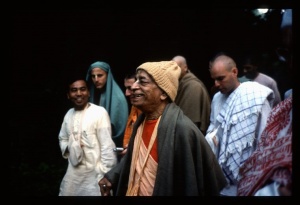SB 6.1.33

A.C. Bhaktivedanta Swami Prabhupada
TEXT 33
- kasya vā kuta āyātāḥ
- kasmād asya niṣedhatha
- kiṁ devā upadevā yā
- yūyaṁ kiṁ siddha-sattamāḥ
SYNONYMS
kasya — whose servants; vā — or; kutaḥ — from where; āyātāḥ — have you come; kasmāt — what is the reason; asya — (the taking away) of this Ajāmila; niṣedhatha — are you forbidding; kim — whether; devāḥ — demigods; upadevāḥ — sub-demigods; yāḥ — who; yūyam — all of you; kim — whether; siddha-sat-tamāḥ — the best of the perfect beings, the pure devotees.
TRANSLATION
Dear sirs, whose servants are you, where have you come from, and why are you forbidding us to touch the body of Ajāmila? Are you demigods from the heavenly planets, are you sub-demigods, or are you the best of devotees?
PURPORT
The most significant word used in this verse is siddha-sattamāḥ, which means "the best of the perfect." In Bhagavad-gītā (BG 7.3) it is said, manuṣyāṇāṁ sahasreṣu kaścid yatati siddhaye: out of millions of persons, one may try to become siddha, perfect—or, in other words, self-realized. A self-realized person knows that he is not the body but a spiritual soul (ahaṁ brahmāsmi). At the present moment practically everyone is unaware of this fact, but one who understands this has attained perfection and is therefore called siddha. When one understands that the soul is part and parcel of the supreme soul and one thus engages in the devotional service of the supreme soul, one becomes siddha-sat-tama. One is then eligible to live in the Vaikuṇṭha planets or Kṛṣṇaloka. The word siddha-sattama, therefore, refers to a liberated, pure devotee.
Since the Yamadūtas are servants of Yamarāja, who is also one of the siddha-sattamas, they knew that a siddha-sattama is above the demigods and sub-demigods and, indeed, above all the living entities within this material world. The Yamadūtas therefore inquired why the Viṣṇudūtas were present where a sinful man was going to die.
It should also be noted that Ajāmila was not yet dead, for the Yamadūtas were trying to snatch the soul from his heart. They could not take the soul, however, and therefore Ajāmila was not yet dead. This will be revealed in later verses. Ajāmila was simply in an unconscious state when the argument was in progress between the Yamadūtas and the Viṣṇudūtas. The conclusion of the argument was to be a decision regarding who would claim the soul of Ajāmila.